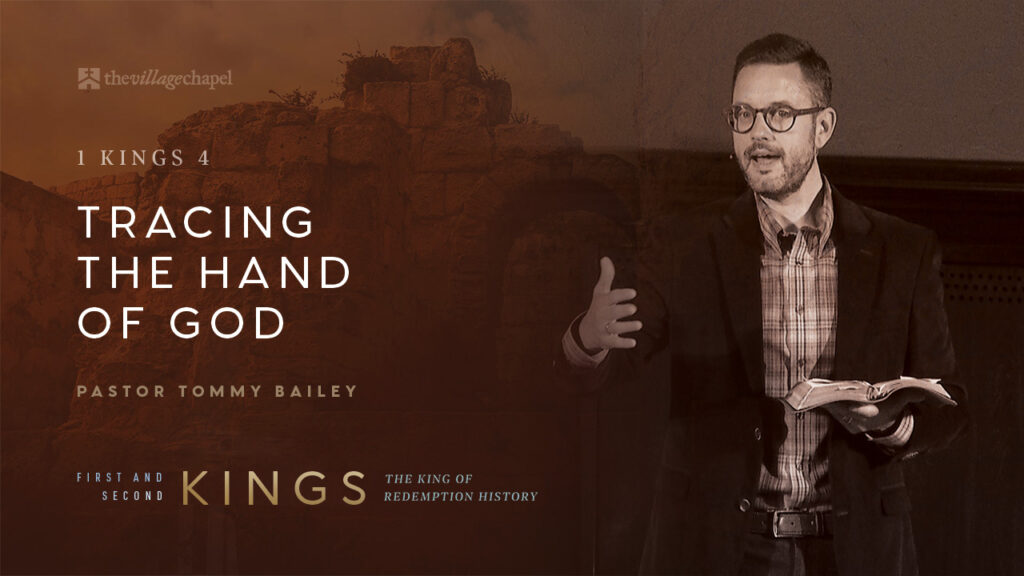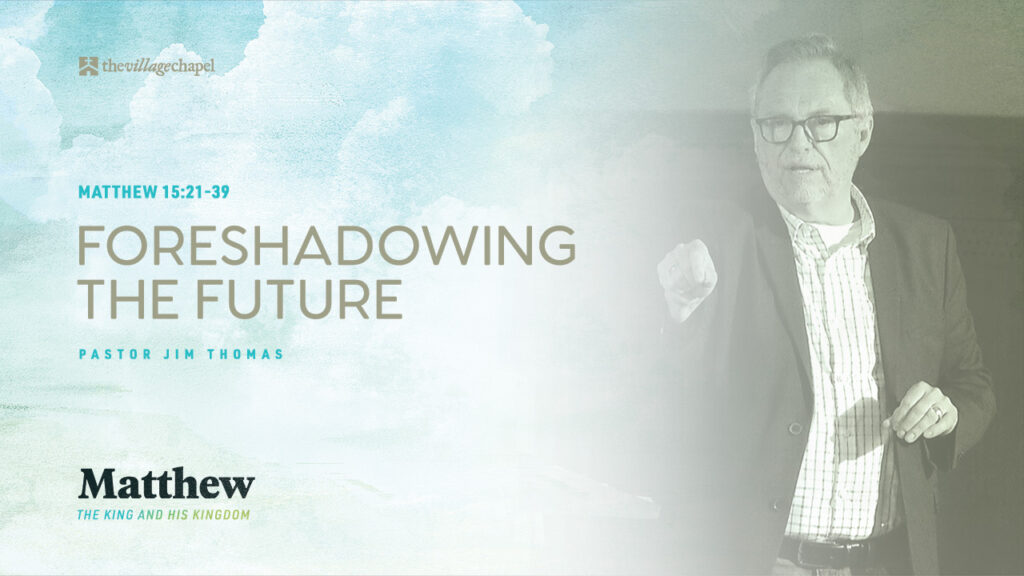Sermon Notes + Quotes:
PDFTranscript:
We study through books of the Bible here at The Village Chapel, and today we continue our study of the book of Genesis. This book that is brimming with the activity of God in the world from the creation of all things from nothing to the consequences of sin that we read about in the flood and the Tower of Babel and other accounts. But through it all, the book of Genesis continually reveals to us a God who is there, whose sovereign hand is guiding and directing, and the New Testament reminds us that from the foundations of the world, the very foundations, He has set a plan in motion to restore what has been broken. We see that here in the book of Genesis, and God’s plan graciously begins with wandering, undulating, stumbling men and women like Noah, like Abram, like Sarah, and later Isaac and Jacob. And the list goes on, people not so different than me, not so different from you. Asking similar questions, faced with similar temptations.
So as we begin our study, I invite you to turn to Genesis chapter 14 in a Bible, if you’d like to follow along, I’ll be reading from the English Standard Version today. My wife and I were watching a TV show this week and it was trying to teach a fairly complex concept and with words and phrases, names that I was largely unfamiliar with. And I found myself at times scratching my head and asking, “Hold on, hold on. What are they trying to say? What are they trying to say?” It was hard to follow, but I’m glad I stuck with it. But I wanted you to be prepared ahead of time that today’s bit of text will have some of those same questions. Some of those “Hold on. What is this text saying?” moments. So hang in there with me and we’ll all learn together as we seek the timeless truths of God’s Word here in chapter 14 of Genesis.
But before we get started, I invite you to pray with me.
Living God, help us to so hear your holy word that we may truly understand, that understanding we may believe, and believing we may follow in all faithfulness and obedience, seeking Your honor and glory in all we do. Through Christ our Lord. Amen.
So turn with me if you would, chapter 14, we’ll start with verse 1:
“In the days of Amraphel king of Shinar, Arioch king of Ellasar, Chedorlaomer king of Elam and Tidal king of Goiim, these kings made war with Bera king of Sodom, Birsha king of Gomorrah, Shinab king of Admah, Shemeber king of Zeboiim, and the king of Bela (that is, Zoar). And all these joined forces in the Valley of Siddim (that is the Salt Sea).[So this would be just south of what we call the Dead Sea.] Twelve years they had served Chedorlaomer, but in the thirteenth year they rebelled.”
Okay, what in the world is going on here? There’s one of those moments. I imagine some of your eyes glazed over as we were reading. So last week the story left off, if you remember, with Abram and his nephew Lot separating. Abram to Caanan, and Lot towards the Jordan Valley near Sodom. And the story concluded with God, if you remember, restating his promise to Abram that all the land that he could see from the east to the west and the north to the south would be given to his descendants to live and flourish as God’s people. Remember though at this point in the story, Abram and Sarah are still childless at this point. They have no descendants yet. The land is not yet theirs and that’s at least interesting. In our text this morning, what we just read, the scene abruptly shifts from the tent of Abram in the particular town called Hebron in the region of Canaan. That’s where we left off to today to a much broader view of an international scene and we’re introduced to four Mesopotamian kings and five other nations near Abram. This is the first mention, by the way, of war in the Bible.
Of the nations listed, we see the kings of Sodom and Gomorrah, two nations that are known for their wickedness, debauchery of all kinds and indifference to justice for the poor and the vulnerable. These, and some of the other nations listed here, become a symbol throughout the Bible of anything that is set against God and against his ways. The king of Sodom, his name Bera means son of evil, the king of Gomorrah, Birsha implies guilt and wrongdoing. We don’t want to make too much of these names, but I think it’s indicative of where we find ourselves in the story of God’s redemptive plan in history, His activity.
So after chapter 13, which we studied last week, ends with a reminder of God’s promise to Abram, the scene abruptly shifts to reveal, at least in part it’s revealing this, that there is strong opposition to God and His purposes. Strong opposition to God and His purposes. Evil is very real. The world, the flesh and the devil always seek to thwart God’s plans and harm God’s people.
This certainly begged the original readers of this text to ask the question, “Can the promises of God be trusted? Can they be trusted?” Pastor Jim mentioned questions like this last week in our study of chapter 13. Abram is given a promise of land and descendants, and here in chapter 14 we seemingly see powerful kings and nations that threaten this promise. What king, out of all those kings listed, what king or is there one that wasn’t listed there is ultimately sovereign in this story?
Let’s continue at verse 5 if you would. “In the fourteenth year Chedorlaomer and the kings who were with him.” So there’s a little alliance going on. “came and defeated the Rephaim in Ashtoroth-karnaim, the Zuzim in Ham, the Emim in Shaveh-kiriathaim, and the Horites in their hill country of Seir as far as El-paran on the border of the wilderness. Then they turned back and came to En-mishpat (that is, Kadesh) and defeated all the country of the Amalekites, and also the Amorites who are dwelling in Hazazontamar.”
Thank you for hanging in there with me on these pronunciations. I’m no Hebrew expert, but I’ve tried to listen to others who are, and there’s my meager effort.
So what we’re witnessing here is a little associated press style, reportage, if you will, of a multinational war. Chedorlaomer and his four nation alliance had conquered and ruled for 12 years, Bera, King of Sodom and his five nation alliance.
So we have two alliances going on and one has conquered and ruled for 12 years and now Bera, King of Sodom and his five nation alliance, they are done paying tribute to Chedorlaomer. So they have rebelled. That’s what the story is telling us. I believe the primary goal, the bulk of this account though was to show the extraordinary power and strength of Chedorlaomer and his alliance.
The text says they went on to defeat the Rephaim. If you remember when we read that, which means giants, which is likely ancestors to Goliath, and we know that story of course David and Goliath and Goliath being the giant. These are big strong folks and the hill country of Seir, Edom likely the most powerful nation in the region. The author wants us to know that Chedorlaomer’s army, which defeated both of those and many others. Their alliance, their army is strong, is powerful, is mighty.
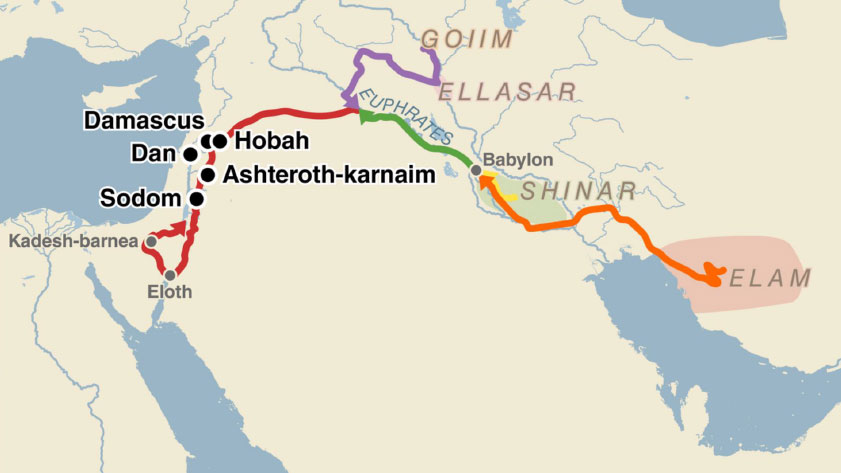
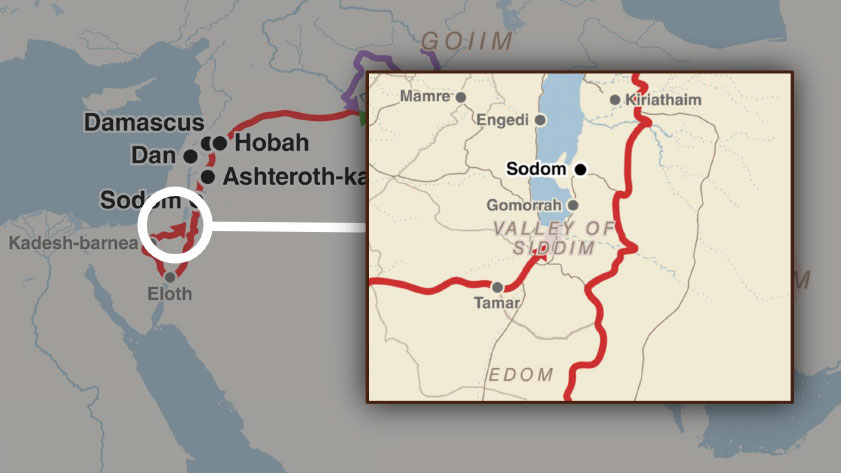
Here’s a map [see picture] that’ll give us a fairly good idea of where all of this took place. So looking at the map on the far right, you can see the Mesopotamian kings, Chedorlaomer and his alliance and they’re coming over towards the left hand side. And you can see if you look at the far left, a little bit more zoomed in the valley of Siddim. So just to the south of the Dead Sea, this is where all of this is taking place.
Let’s continue reading at verse 8. “Then the king of Sodom, the king of Gomorrah, the king of Admah, the king of Zeboiim, and the king of Bela (that is, Zoar) went ou,t and they joined battle in the valley of Siddim. “[And that is what we just saw there in the map south of the Dead Sea. So they’re going to battle Chedorlaomer and his alliance.] “with Chedorlaomer king of Elam, Tidal king of Goiim, Amraphel king of Shinar, and Arioch king of Elassar, four kings against five. Now the Valley of Siddim was full of bitumen pits.”
So tar pits if you will, “and as the kings of Sodom and Gomorrah fled,” So they have lost this battle and they must have lost it quickly because it’s not even mentioned here. It’s just now they’re fleeing, they go to battle and now they’re fleeing. And some of them fall into these bitumen pits. The kings of Sodom and Gomorrah fled.
“Some fell into them and the rest fled to the hill country. So the enemy took all the possessions of Sodom and Gomorrah, and all their provisions and went their way. They also took Lot.” All right, so here is why we’re reading all of this military news, if you will. Abram’s nephew, Lot, has been taken. “They also took Lot, the son of Abram’s brother, who was dwelling in Sodom, and his possessions, and went their way.”
So in this battle against Chedorlaomer, Sodom and their allies were defeated and scattered and caught up in this multinational incident of course is Abram’s nephew Lot who we now see is dwelling in Sodom. Interesting that in chapter 13, which we studied last week, Lot moved near Sodom. That’s what the text said. He moved near Sodom and now we read that he’s moved into town and later we’ll read that he has not only moved into town, he’s found at the city gate, indicating his full immersion into the city. It seems that at best Lot is drifting. You don’t by the way ever drift into godliness, into holiness, into faithfulness. So at best he’s drifting or at worst perhaps he’s lost. Both physically displaced, he’s been taken from his home with his family in possessions, but also perhaps spiritually lost. Opposed or indifferent to the things of God, making home in a city notorious for its shameless wickedness.
Can you remember the last time that you were lost? I mean physically or geographically lost? Perhaps you were on a family road trip and I’ve done this before. You’re with multiple vehicles and you come to a spot where there’s no cell phone signal and you look up and you realize the car in front of you that you were following is no longer there. You’re lost. You don’t know where you are, you’re disoriented. Or perhaps on the other end, you’re a parent and you took your young child grocery shopping and you set him or her down for just a moment as you chose from the seemingly endless variety of Cheerios and you turn around and you realize that your child is gone. There’s a gut level reaction, something precious has been lost and you’ll stop at nothing to find your child. I think we can all relate to these examples of lostness.
When I was about seven years old, my parents took me to a babysitter for the day and we lived in Atlanta, Georgia around this time. And the sitter’s house was just far enough out of the city that it sat right behind a rather large forest. And there were a few other kids who were being watched that day. And me and another boy a little bit older than me decided it’d be a good idea to go explore this forest. And I don’t remember many of the details to be honest, but I have three distinct memories that are seared into my mind. First, after we had finished exploring, there came a point while we were in this forest that we realized we were lost. I remember that. There’s a particular moment, a very particular moment when I realized I am not where I’m supposed to be. We were out there for several hours and into the evening.
And the second distinct memory I have is of a police officer calling out our names. I don’t remember his name, but “Tommy. Tommy.” I even remember the policeman coming toward us and taking his radio into his hand and calling it in that we had been found. I remember that. The third memory I have is the look of relief and joy on my parents’ faces and in their body language.
There’s something that all of us experience to some degree or another when we are lost and it tells us something I think of how we were created. We were created to belong to something more than ourselves, to be a part of the family, a community, a location, a creator, a way of life that leads to flourishing.
To take that a step further, that means that we were never intended to live solely for ourselves.
We weren’t meant to bear that weight, that God-given warning that says “I’m not where I’m supposed to be”, has the same force and weight, whether we’re lost in a forest or if we’ve made choices that move us away from God, his people, his ways. Which often leads to moving towards foolishness and then ultimately finding ourselves entangled in the self-destruction that sin will produce.
The author of the New Testament book, Hebrews though, gives us a compass to follow Hebrews 12:1-2. “Let us also lay aside every weight and sin which clings so closely and let us run with endurance the race that is set before us looking to Jesus, the founder and perfecter of our faith.”
So beautiful. The way back from being lost from our drifting ways is not just the brake pedal as Pastor Jim often says, “Stop doing this, stop doing that.” It might be that, but it’s also the gas pedal in the right direction. Throw off everything that hinders and entangles. Yes, turn around and then run as fast as you can with endurance to the one who says, “Follow me. I am the way, the truth and the life. My yoke is easy and my burden is light.” There’s hope on offer for anyone who is lost and that’s good news for us today.
So let’s go back to the story if you would. Verse 13, “Then one who had escaped came and told Abram the Hebrew, who was living by the oaks of Mamre the Amorite, brother of Eshcol and of Aner.“
So somebody escaped, a fugitive perhaps and they ran, maybe it’s from Lot we don’t know, but perhaps Lot sent them to Abram and this guy’s telling Abram, “Hey, Lot’s been taken.”
“These were allies of Abram. When Abram heard that his kinsman had been taken captive, he led forth his trained me,n born in his house.”
So we have a household militia here, 318 of them, very interesting. 318, not 320, not 319, not 317, 318. This just once again reminds us of the authenticity of this text. “318 of them, and went in pursuit as far as Dan. And he divided his forces against them by night.” So there’s some strategy here.
“He and his servants and defeated them.” Who did he defeat? Chedorlaomer and his alliance. Remember how strong this text indicated? And Abram and his 318 of them defeated them “and pursued them to Hobah, north of Damascus. Then he [Abram] brought back all the possessions, and also brought back his kinsman Lot with his possessions, and the women and the people.”
Amazing story. So here by the way, this is the first account of Abram in this international story. We haven’t even read about Abram until right now. We don’t know much about his military prowess and skill, although we see some strategy at play here by dividing his meager forces and attacking at the stealth of night.
So there’s obviously some skill here, but I think the bigger point of this account is that we are witness to the resolute faith of Abram in God’s sovereign hand over all things. The odds simply do not matter to the creator of all things. The Rephaim, the giants could not defeat Chedorlaomer and his alliance. The five king alliance of Sodom and Gomorrah and the other nations could not defeat Chedorlaomer. But Abram in his household, militia of 318, routed them, defeating them, pursuing them and bringing back all the possessions and all the people including his nephew Lot and all of his possessions and all of his people. This is a complete route. The odds simply do not matter to the creator of all things. I think that’s what the text is telling us here.
Now let’s continue at 17 if you would, verse 17, “After his return from the defeat of Chedorlaomer“, that’s Abram “and the kings who were with him, the king of Sodom went out to meet him at the valley of Shaveh (that I,s the King’s Valley).” So much king language here we’ve already read about nine different kings and here now we’re in the Kings Valley, verse 18. “And Melchizedek king of Salem.” All right, here’s the 10th. “King Melchizedek king of Salem brought out bread and wine. (He was priest of God Most High.) And he blessed him and said,
‘Blessed be Abram by God Most High, Possessor of heaven and earth; and blessed be God Most High, who has delivered your enemies into your hand!’
And Abram gave him a tenth of everything. And the king of Sodom said to Abram, ‘Give me the persons.’ So he is making a little deal here, trying to make a little deal. ‘Give me the persons but take the goods for yourself.’ But Abram said to the king of Sodom, ‘I have lifted my hand to the Lord, God Most High, Possessor of heaven and earth.’ So there he’s quoting Melchizedek, interesting. “I have lifted my hand to the Lord God Most High, Possessor of heaven and earth, that I would not take a thread or a sandal strap or anything that is yours, lest you should say, ‘I have made Abram rich.’ I will take nothing but what the young men have eaten, and the share of the men who went with me. Let Aner, Eschol, and Mamre take their share.” Fresh off of his defeat of a powerful military alliance, Chedorlamoer to rescue Lot. We find Abram in this valley of the kings of Shaveh and before him is two kings.
Did you catch this? On one hand, we had Bera, king of Sodom, which means son of evil. On the other hand we had Melchizedek, the king of Salem. His name means king of righteousness. Salem means peace. He’s both the king of righteousness and the king of peace over here. And we have the son of evil over here.
So first of all, who is this mysterious figure? Melchizedek, the 10th king mentioned in this story from this text alone, we simply do not know much. Every major character up to this point has a lineage ascribed to them. Melchizedek does not. He just appears and then he leaves the stage. It’s likely that he is a king of what would later become Jerusalem but is now simply known as Salem. The text says that he’s a priest king.
Now this may have been a common thing with the pagan nations and Mosaic Law, as you know, wouldn’t come until years later. But to mix the offices of priest and king in later Israel would be strictly forbidden. It was unheard of. The first king of Israel, Saul, if you recall, loses his throne in large part because he tries to be both priest and king. A priest role being an intermediary between God and his people, a holy God and a sinful people. And the king’s role is to be God’s representative to the people, to uphold his law.
Melchizedek is a mystery, but it shouldn’t be lost on us that he is a foretaste. And we see this in the book of Hebrews, a foretaste of the priest king to come from the line of Abram who would bring to fruition the promise to Abram that through him all the nations of the earth would be blessed. A thousand years later, King David would write Psalm 110 telling us that there would be a greater king than even he, King David, who had come from the order of Melchizedek.
And the New Testament book of Hebrews, like I mentioned, tells us exactly who it is. And that’s King Jesus. A fulfillment of all the promises that are being made here. The story of God’s sovereign hand, his redemptive activity in the world is on full display in the first pages of scripture through David and runs right through to Christ and continues now until the day when he, the king of kings will return to fully establish his kingdom of righteousness. Such good news. So as we consider what we’ve studied this morning, I wanted to leave us with a couple observations for us to savor. So what do we see in this story? Number one, we see Abram’s growing faith in God. As we’ve read the past few weeks, Abram doesn’t display perfect faithfulness. Like me and like you, he waivers, he undulates. But we do see a growing posture of obedience, a posture that rests in the promises of God because he trusts in the character of God, something we discussed in part last week.
That’s what the whole story is ultimately about. Abram’s story is not given to us simply as an example to follow, although there are many things we should follow in Abram’s life. The whole thrust of Genesis, though, the whole book is continually revealing to us that there is someone in charge who will see his promises through. Against all odds, Abram sets out on a rescue mission for his nephew Lot, taken by extraordinarily powerful kings. In the meeting of the Valley of Shaveh, Melchizedek blesses Abram and ascribes the victory to God Most High possessor of heaven and earth. He owns it all and Melchizedek reminds us of that. He recognizes the true sovereign, the true king in this entire story. And how does Abram respond? He responds with humble submission, giving a 10th of everything, a natural overflow of gratitude for the gift of his nephew’s return, the gift of victory. This natural overflow of gratitude is a mark, my friends of growing faith.
Faith itself though is a gift. Abram was called by God out of a pagan nation. If you remember all the way back when we were introduced to Abram, Abram was called by God, he was given the gift of faith. And today we read about Abram seeking after his lost nephew Lot. But don’t forget that God sought after Abram first and Abram’s response to God’s call was obedience in the right direction? Not perfect, but we see his growing faithfulness in this text today and we’ll continue to read about that.
The book of Hebrews elaborates on this.
“By faith Abraham obeyed when he was called to go out to a place that he was to receive as an inheritance. And he went out, not knowing where he was going. By faith he went to live in the land of promise, as in a foreign land…For he was looking forward to the city that has foundations, whose designer and builder is God.”
Hebrews 11:8-10 (ESV)
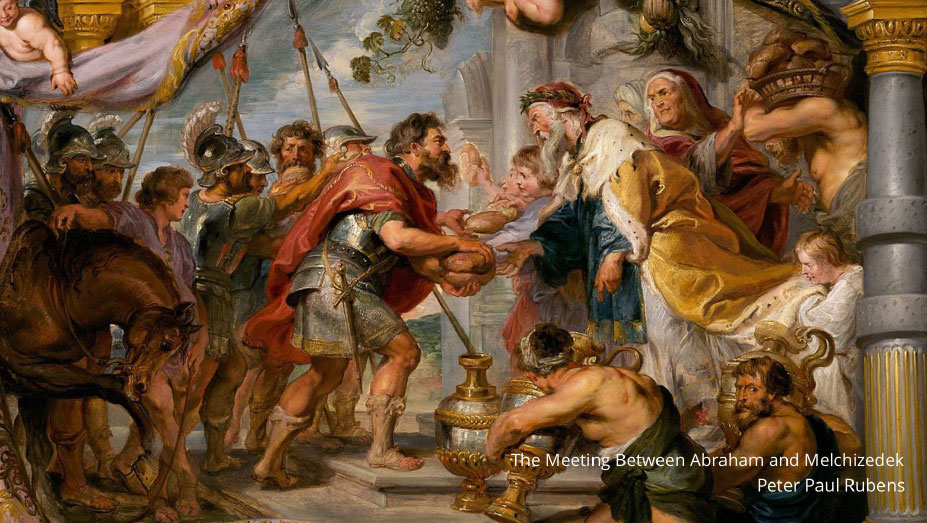
Although Abram didn’t have a view that we do this side of the cross, he looked forward to what the promises of God would bring to all nations through his obedience. I love this painting (see picture) by Peter Paul Rubens around 1625. Abram here is shown in a humble posture. He’s the one in the middle with the red cape showing humble submission to God’s representative in Melchizedek. Such a beautiful portrait of humility, of faith.
Second thing I think we can savor and we observe here in this text, God’s sovereign hand at work. The story has 10 kings listed. The valley at the end is called the King’s Valley. A lot of kingly language here. Melchizedek is a priest king, but we know that there is a king who stands above them all. Melchizedek called him God Most High. He’s the sovereign.
But not only is he sitting on the throne, I think this is an important thing. He’s actively involved in the affairs of man. God is not a cold detached deity. He’s working in human history to bring his promises to fruition through faithful followers like Abram. His sovereign hand, his activity in the world. He’s working today graciously calling to anyone who has ears to hear. “Follow me, follow me.”
I don’t know where you find yourself today. Maybe you see a little of yourself in Abram, undulating and wavering at times, but slowly growing in faith. Listen to the words of Hebrews again. “Let us run with endurance the race that is set before us, looking to Jesus, the founder and perfecter of our faith.” Reminder friends, faith is a gift. We don’t work it up on our own. It’s a bit of a mystery, but we are called. We are called to run with endurance, but we are called to look to Jesus, who is both the founder and the perfecter. Friends, keep running in His direction.
Perhaps you find yourself a little more like lot drifting lost, realizing that you are not where you’re supposed to be. It’s never too late to turn around. It’s never too late to run towards Jesus. And for you, same thing.
Let’s actually read the entire text of Hebrews 12:1-2.
“Therefore, since we are surrounded by so great a cloud of witnesses.” Who are these witnesses? Well, one of them is Abram. When you read the book of Hebrews, one of these witnesses in this cloud is Abram, those who have gone before us. “Therefore, since we are surrounded by so great a cloud of witnesses, let us also lay aside every weight and sin which clings so closely and let us run with endurance the race that is set before us. Looking to Jesus, the founder and perfecter of our faith, who for the joy that was set before him, endured the cross, despising the shame, and is seated at the right hand of the throne of God.”
Hebrews 12:1-2 (ESV)
Run to Jesus. What direction am I going? Good question. Same question for Abram. Same question for lot for you and for me. Run in the direction of Jesus.
Would you pray with me? Lord, we acknowledge that you are our king. For those who are running the race but are weary, we pray for strength. We pray for grace, for every step of the journey, for those who find themselves lost, drifting not where they are supposed to be. Spirit, we pray that you would soften hearts, that you would open ears to hear your word, that you would open eyes so that we might run after you looking to you Christ. What you’ve done for us on the cross, we thank you. We thank you for the hope of the resurrection. That means one day you will come. The king of righteousness, the king of peace. Lord, thank you for a text like this that reminds us that you’re in charge. In Jesus’ name, Amen.
(Edited for Reading)








